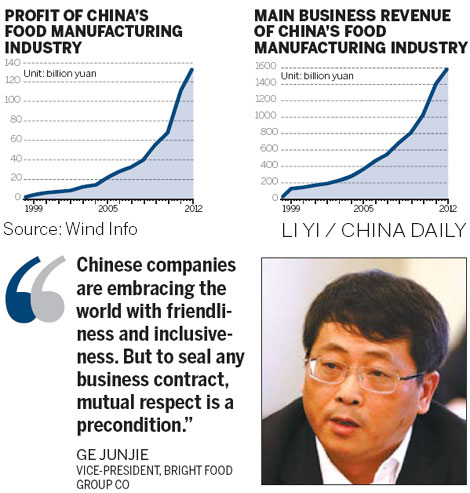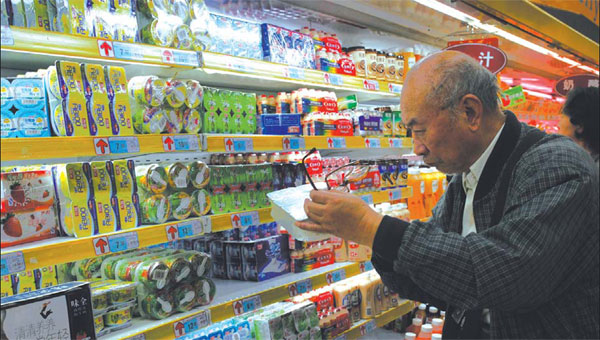Going global helps to feed aspirations
Updated: 2013-03-28 07:39
By He Wei (China Daily)
|
||||||||
|
A customer compares dairy products at a supermarket in Shanghai. Bright Food Group Co now holds a 5.7 percent share of China's 174 billion yuan dairy market, ranking it fourth in the domestic market, according to Euromonitor International. Provided to China Daily |
But Ge Junjie does so with his eyes wide open to pitfalls
Ge Junjie doesn't drink milk or alcohol. As vice-president of Bright Food Group Co, Ge often needs to convince people how he manages to run a business that he himself doesn't engage in much during his leisure time.
So here is his winning formula: "Because I don't drink them myself, I try my best to sell them."
Ge, 54, joined the Shanghai Tangjiu Group Co Ltd 33 years ago upon graduation with a degree in accountancy. The company, a major manufacturer and distributor of candies and alcohol, became a fully owned subsidiary of Bright Food in 2006, which now ranks as China's second-largest food vendor by revenue.
Bright Food was formed amid a series of mergers and consolidations of State-owned assets. Shanghai municipal government is the company's controlling stakeholder.
Today, the corporation has grown into a huge comprehensive food industry group that covers modern agriculture, food processing and production and food distribution. The group's total assets were valued at 82 billion yuan ($13.2 billion) and its revenue from primary business reached 75 billion yuan last year.
It now holds a 5.7 percent share of China's 174 billion yuan dairy market, ranking it fourth in the domestic market, according to Euromonitor International.
Bright Food accrued a market share of 1.4 percent in terms of packaged foods and 1.6 percent in the ice cream market, said the London-based researcher. Major competitors include domestic counterparts such as Inner Mongolia Mengniu Dairy (Group) Co Ltd and Inner Mongolia Yili Industrial Group Co Ltd, in addition to foreign players such as Nestle SA.
But seven years ago, there was an industry malaise plaguing almost all State-owned enterprises because they operated less efficiently with obsolete business models. Ge decided to reverse this tide by mapping out a global ambition and tuning into international standards.
After taking the helm as a top executive overseeing the company's overseas expansion, Ge sensed a growing demand for imported food, fueled by the burgeoning middle class with an increasing disposable income.
However, beyond the headlines about China's growing global clout, Ge believed that the establishment of world-class domestic companies was lagging behind the overall growth of the economy. This put China at a disadvantage, which led to limited bargaining power at industry-wide talks.
He referred to a visit two decades ago to the headquarters of Nestle, the world's largest food company by revenue. In addition to the various flavors of ice creams he tasted, Ge was most impressed by a poster outside a research and development laboratory.
"How could you let a girl with freckles on her face advertise for you?" Ge asked his French counterpart, puzzled. He was told the advertisement was designed for the Japanese market because girls with freckles were regarded as cute and beautiful in Japanese culture.
It suddenly occurred to Ge that to increase the number of China's equivalents of Nestle, The Coca-Cola Co, McDonald's Corp or Walmart Stores Inc required not only great financial resources but also management experiences in international marketing, high technology, as well as branding skills.
To beef up market vitality, Ge steered the company to make overseas acquisitions. He identified several channels to expand overseas, significantly through mergers and acquisitions.
Under his leadership, the company is rolling out a steady overseas plan. It aims to expand its major businesses - dairy, wines, sugar, branded food and distribution channels - overseas. Prioritized destinations are Australia, New Zealand and Europe. The company aims to boost overseas sales to as much as 30 percent of its total in five years. So far, Bright Food has completed four major international buyouts in the past two years. But Ge warns corporate decision-makers to balance their "passion and rationality" in international deals.
On the one hand, there is a spontaneous drive for Chinese companies to go beyond borders, as international costs for obtaining resources and financing keep dropping, while a high level of efficiency remains in place. On the other hand, companies should avoid making international transactions for the sake of going global and ought to stick to their own bottom lines.
"When we were in final talks with Diva Bordeaux, a major French wine merchant, Diva's financial consultant kept raising the bid price and insisted that Bright Food made corresponding changes to the new corporate structure," Ge recalled.
Even though Ge had been pursuing the potentially lucrative deal for months, he chose to pull out after unreasonable demands were made and took the next flight from Paris to Shanghai. "The internationalization of Chinese companies should never come at the expense of unfair treatment and losing dignity," Ge said.
The story ended in a rather dramatic way. The consultant flew all the way to Shanghai to apologize to Ge and accepted every clause the two parties had earlier agreed to.
"Chinese companies are embracing the world with friendliness and inclusiveness. But to seal any business contract, mutual respect is a precondition," he told his counterpart. That pretty much explained how Ge let go several major bids including the purchase of French yogurt maker Yoplait SA and the sugar unit of CSR Ltd.
Zhang Huiming, head of the Enterprise Research Institute at Fudan University, said Bright Food's previous failures were largely attributable to its insufficient investment plans. "Companies should always use financial institutions to diversify their investment portfolio, which increases the odds of success. Bright Food must have learned a lot from its seasoned rivals in terms of acquisition plans and negotiation skills," said Zhang.
But Ge said he didn't think of those as failed projects. "Bright Food made international movements by evaluating our needs and gains. We should never sacrifice our own interests."
In fact this is a universally applied principle. When finalizing the acquisition deal with Manassen Foods Australia Pty, a branded food business, Ge recalled the warm welcome he received from the minority shareholders in Australia.
Although Ge's offer was not the highest among all the bidders, Manassen's management team appreciated Bright Food's business values and bet on the prospects offered by its distribution channels in the vast Chinese market.
Ge stressed that M&As are not the only solution to gain traction in a foreign market. Companies can choose to become strategic investors to cater to a specific need, which doesn't necessarily involve comprehensive cooperation. For instance, Bright Food may leverage Diva's distribution channels to access French wine dealers but it doesn't need to invest in heavy assets.
Business is not all about money, which is the vivid lesson Ge has learned. Going global is a steady course that Chinese companies should learn over time. They should learn to form a sound relationship with key business middlemen such as law firms, accounting agencies and banks.
Chinese companies should also fully take into account business risks including the debt ratio, political stability and social benefits.
Two "historical" moments during international negotiations have long captivated Ge. When he addressed hundreds of local employees on the topic of "Manassen's future and dream", Ge felt that Chinese people had really stood up to the world.
The second story is somewhat more sentimental. During a trip to Bordeaux, Ge met an old lady who ran a century-old vineyard.
She told Ge her great-great-grandfather started the business and today her great-great-grandson was working for the same vineyard. "Doing the same thing for several generations is a secret of success. That's what I have always desired," he said.
hewei@chinadaily.com.cn

(China Daily 03/28/2013 page15)

 Li Na on Time cover, makes influential 100 list
Li Na on Time cover, makes influential 100 list
 FBI releases photos of 2 Boston bombings suspects
FBI releases photos of 2 Boston bombings suspects
 World's wackiest hairstyles
World's wackiest hairstyles
 Sandstorms strike Northwest China
Sandstorms strike Northwest China
 Never-seen photos of Madonna on display
Never-seen photos of Madonna on display
 H7N9 outbreak linked to waterfowl migration
H7N9 outbreak linked to waterfowl migration
 Dozens feared dead in Texas plant blast
Dozens feared dead in Texas plant blast
 Venezuelan court rules out manual votes counting
Venezuelan court rules out manual votes counting
Most Viewed
Editor's Picks

|

|

|

|

|

|
Today's Top News
Boston bombing suspect reported cornered on boat
7.0-magnitude quake hits Sichuan
Cross-talk artist helps to spread the word
'Green' awareness levels drop in Beijing
Palace Museum spruces up
First couple on Time's list of most influential
H7N9 flu transmission studied
Trading channels 'need to broaden'
US Weekly

|

|








